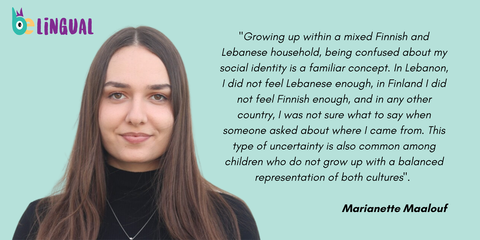|
For the past month and a half, since I began my internship at Familia, I have been working as a part of the BElingual team which aims to support families with under school-aged, multilingual children. There are over 70,000 intercultural couples and families in Finland, with half of them including intercultural children. Because of this, a project like BElingual certainly has a place within the contemporary Finnish society. Growing up within a mixed Finnish and Lebanese household, being confused about my social identity is a familiar concept. In Lebanon, I did not feel Lebanese enough, in Finland I did not feel Finnish enough, and in any other country, I was not sure what to say when someone asked about where I came from. This type of uncertainty is also common among children who do not grow up with a balanced representation of both cultures. The development of intercultural children’s social identities is a main factor behind the development of this project, since our early childhood education experts believe that there can be negative consequences if such children do not receive the support they need.
An intercultural child growing up in Finland faces several different challenges, especially once they begin attending regular Finnish school. For instance, children who may not speak Finnish as their first language at home, may develop a negative self-image based on a belief that they’re not as smart or capable as their classmates, just because they may not have as rich of a Finnish vocabulary. This was certainly the case with my Finnish elementary school days when I was torn between speaking Finnish, English, or Arabic with family and friends. Such lack of balance can also affect the child’s self-esteem, making them not want to play with their peers in fear or being teased or not being able to fit in. With these consequences in mind, we have been working with families to test ideas and develop family clubs for families with under school-aged intercultural and multilingual children in different minority languages. During the clubs, children are able to interact with other children who speak the same language, participate in language activities and play to enrich their vocabulary and cultural understanding, in a positive environment. The BElingual team will be having an information session on Monday, January 17th to talk about how families can become involved in the BElingual Family Network, in addition to different volunteering opportunities for interested parents. The family network is a space that is being co-developed with families and where everyone is welcome to bring their ideas, meet other families and together build a supportive community. Personally, this opportunity for celebrating my other native language in a fun, child-friendly space would have been very constructive for myself when growing up in Finland. Hence, it has been great to be a part of the BElingual team and work on developing these clubs. Marianette Maalouf Intern Familia Ry
0 Comments
Leave a Reply. |
blogi - blogAjatuksia ja kokemuksia elämästä kahden kulttuurin keskellä.
Reflections and experiences from the life of intercultural families. kategoriat
All
osallistuToivotamme sinut lämpimästi tervetulleeksi osallistumaan blogiyhteisöömme: lue, kommentoi ja kirjoita!
Kirjoittajina voivat toimia kaikki kahden kulttuurin arkea elävät ja aiheesta kiinnostuneet. Kynnystä kirjoittamiselle ei tule nostaa liian korkealle ja kirjoittaa voi joko omalla nimellä tai nimimerkillä. Blogissa esitetyt näkökannat ja mielipiteet ovat kirjoittajien omia, eivätkä edusta Familian kantaa. Kahden kulttuurin arki on itsessään kiinnostavaa ja siitä kirjoittaminen voi avata myös itselle uusia näkökulmia! Blogikirjoituksia voi tarjota sähköpostitse (info@ familiary.fi) tai yhteydenottolomakkeen kautta. Lopullisen valinnan julkaistavista jutuista tekee Familian henkilökunta. Tervetuloa mukaan! participate!We warmly welcome you to participate in our blog community: read, comment, and write!
Anyone who lives and works in the world of intercultural families and is interested in the topic is welcome to contribute. The threshold for writing should not be too high, and you can write either under your own name or under a pseudonym. Keep in mind that the views and opinions expressed in the blog are those of the authors and do not represent the position of Familia. The everyday life of intercultural families is interesting and writing about it can also open new perspectives for you! Your story matters and helps to raise awareness about the opportunities and challenges within intercultural families. Blog contributions can be submitted by e-mail (info@ familiary.fi) or via our contact form. Final selection and edition of the stories to be published will be conducted by our staff. Welcome to join us! |
|
|
© Familia 2024


 RSS Feed
RSS Feed

